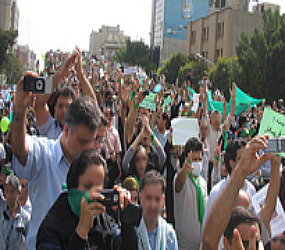Tuesday, August 24, 2010
|
Home
>
Radio Zamaneh in English
>
Latest News
>
Iran continues arrests and media censorship
|
Iran continues arrests and media censorship

Friday's protesters in Tehran
With the persistence of Iranian protests, the authorities continue their campaign of arrests and media censorship. Last night two young members of the Islamic Iran Participation Front, the reformist group with many senior members already incarcerated, were arrested in Tehran.
In the past ten days, children of many reformist activists have been arrested, children of senior members of the Participation Front as well as children of reformist clerics.
Web journalists have also become a chief target of government arrests. Ali PirHoseinlu and his wife, Fatemeh Sotoudeh were arrested after their house was raided on the night of September 17. They were both charged with “threatening national security.”
PirHoseinlu has cooperated with various banned reformist newspapers specifically with the campaign office of MirHosein Mousavi, disputing candidate of the June presidential elections that triggered the wave of protests that has gripped the country for over two months.
Reporters Without Borders has also expressed concern over the plight of journalists and the state of web censorship in Iran.
“The Internet and its users have become the new targets for repression by President Mahmoud Ahmadinejad’s supporters in the past two weeks,” Reporters Without Borders said. “After suspending newspapers, the authorities are attacking one of the easy ways to access information about arrests and protests in Iran.”
Almost every site in Iran has been hacked into or blocked. Sites such as Norooz, the Islamic Iran Participation Front website and Parleman News, the website of the minority reformists of the parliament, as well as Tagheer and Madreseh Feministi are regularly filtered.
During Friday’s protests filtering of web activities was at a height. While Iranian officials claim that yesterday's protests were insignificant, eyewitness reports,YouTube postings and pictures of protesters testify to the presence of tens of thousands of people who braved the march despite threats issued by the police and the Revolutionary Guards.
Since yesterday Gmail and Yahoo were added to the state’s list of filtered sites which already included YouTube, Facebook and Twitter. More than five million national and international sites are blocked in Iran. The list of the sites that have to be filtered are given to internet providers to block public access to the state’s banned topics and information.
|
|


Comments of the visitors
Attention!!The Goverment and mojtaba khamenei want Ahmadinejad as the Eternal President.We must stop it
-- !ﺍﺮﺘﺶ١٨ﺘﯿﺮ ، Sep 20, 2009There are various intellectuals who prophesied, some years ago, that internet, like globalization, would be an instrument of oppression and domination used by powerful governments and countries against the minorities. Fortunately, they're wrong: access to internet grows everyday in the world and allows claims from different regions of the planet. So, Iranian government certainly won't be able to stop news about its oppressive regime. Nevertheless, I have to recognize that he can be successful in diminishing access to information, particularly inside Iran.To prevent it, every conscious Iranian and non-Iranian person can help by using cell phones, internet etc. To this cause, even hackers are welcome...
-- Guilherme Fontão ، Sep 22, 2009